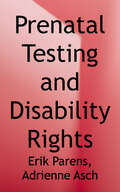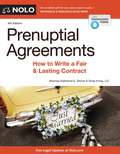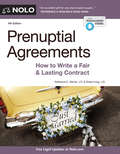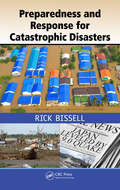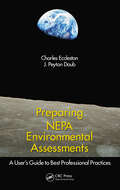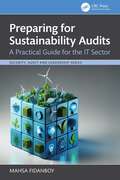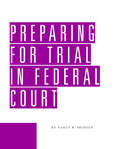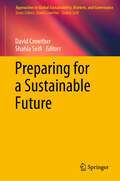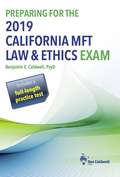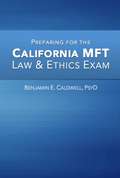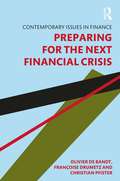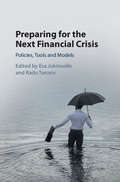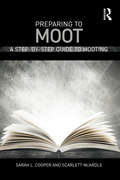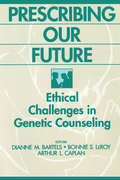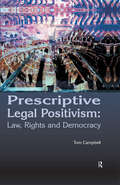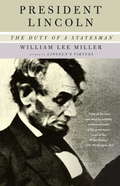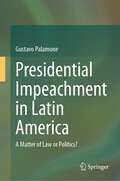- Table View
- List View
Prejudicial Appearances: The Logic of American Antidiscrimination Law
by Robert C. Post Judith Butler Reva B. Siegel K. Anthony Appiah Thomas C. GreyIn Prejudicial Appearances noted legal scholar Robert C. Post argues modern American antidiscrimination law should not be conceived as protecting the transcendental dignity of individual persons but instead as transforming social practices that define and sustain potentially oppressive categories like race or gender. Arguing that the prevailing logic of American antidiscrimination law is misleading, Post lobbies for deploying sociological understandings to reevaluate the antidiscrimination project in ways that would render the law more effective and just. Four distinguished commentators respond to Post's provocative essay. Each adopts a distinctive perspective. K. Anthony Appiah investigates the philosophical logic of stereotyping and of equality. Questioning whether the law ought to endorse any social practices that define persons, Judith Butler explores the tension between sociological and postmodern approaches to antidiscrimination law. Thomas C. Grey examines whether Post's proposal can be reconciled with the values of the rule of law. And Reva B. Siegel applies critical race theory to query whether antidiscrimination law's reshaping of race and gender should best be understood in terms of practices of subordination and stratification. By illuminating the consequential rhetorical maneuvers at the heart of contemporary U. S. antidiscrimination law, Prejudical Appearances forces readers to reappraise the relationship between courts of law and social behavior. As such, it will enrich scholars interested in the relationships between law, rhetoric, postmodernism, race, and gender.
Prejudicial Error
by Bill BlumAppointed by the court to represent an African-American gang leader who has been accused of killing an LAPD vice cop, John Phillip Solomon is forced to confront his longtime nemesis, who represents the prosecution.
Prekäre Verbindlichkeiten: Studien an den Problemschwellen normativer Ordnungen (Wissen, Kommunikation und Gesellschaft)
by Jürgen Raab Justus HeckVertrauensverluste und Glaubwürdigkeitskrisen von gesellschaftlichen Institutionen sind Ausdruck der Pluralisierung von Werten und Normen und der zunehmenden Verhandelbarkeit, Labilität und Ungewissheit für allgemein und beständig genommener Verbindlichkeiten. Die im Band versammelten Studien zu Sprechweisen, Freiheitsdiskussionen, Rechtsfindungen und Polizeiarbeiten geben solch prekäre Verbindlichkeiten als Problemschwellen normativer Ordnungen zu erkennen. Ihre Komplexität fordert die Geistes-, Kultur und Sozialwissenschaften heraus, tradierte Verständnisse, Begriffe und Methoden zu prüfen, zu aktualisieren, zu erweitern und zu verfeinern. Diese Sondierungs- und Präzisierungsarbeiten sind nur interdisziplinär zu leisten. Hierfür stellt das hier unterbreitete Forschungskonzept der prekären Verbindlichkeiten ein vielversprechendes Potential in Aussicht.
Prenatal Testing and Disability Rights
by Adrienne Asch Erik ParensAs prenatal tests proliferate, the medical and broader communities perceive that such testing is a logical extension of good prenatal care--it helps parents have healthy babies. But prenatal tests have been criticized by the disability rights community, which contends that advances in science should be directed at improving their lives, not preventing them. <p><p>Used primarily to decide to abort a fetus that would have been born with mental or physical impairments, prenatal tests arguably reinforce discrimination against and misconceptions about people with disabilities. In these essays, people on both sides of the issue engage in an honest and occasionally painful debate about prenatal testing and selective abortion. <p><p>The contributors include both people who live with and people who theorize about disabilities, scholars from the social sciences and humanities, medical geneticists, genetic counselors, physicians, and lawyers. Although the essayists don't arrive at a consensus over the disability community's objections to prenatal testing and its consequences, they do offer recommendations for ameliorating some of the problems associated with the practice.
Prenups for Lovers
by Arlene G. DubinThis ring-to-altar guide is a valentine to anyone who's dating, contemplating marriage, living with someone, or engaged.
Prenuptial Agreements: How to Write a Fair & Lasting Contract
by Shae Irving Katherine StonerMarriage is one of the few personal contracts in which your state dictates the terms--unless you create your own customized premarital agreement. Combining Nolo's legal expertise and plain-English writing, Prenuptial Agreements makes a potentially touchy subject easy to deal with while explaining how to create a valid contract. This easy-to-use book covers: whether a prenup is right for your relationship how to decide what a prenup should include how to deal with special situations, such as one spouse's debts, business ownership, or kids from a previous marriage how to assemble a draft agreement how to turn your draft into a contract tips on negotiating and communicating This edition of Prenuptial Agreements is completely revised and updated to reflect current state laws, plus worksheets and clauses for preparing an agreement that suits your unique needs.
Prenuptial Agreements: How to Write a Fair & Lasting Contract
by Shae Irving Katherine StonerPlan today for peace of mind tomorrow Marriage is one of the few personal contracts in which your state dictates the terms—unless you create your own customized premarital agreement. Combining Nolo's legal expertise and plain-English writing, Prenuptial Agreements makes a potentially touchy subject easy to deal with while explaining how to create a valid contract. This easy-to-use book covers: whether a prenup is right for your relationship how to decide what your prenup should include how to deal with special situations, such as one spouse’s debts, business ownership, or kids from a previous relationship how to put together a draft agreement how to turn your draft into a contract tips on negotiating and communicating with your partner Prenuptial Agreements makes a potentially touchy subject easy to deal with while explaining the foundations of a solid contract. This edition is completely updated to provide the latest laws of your state and includes instructions any couple can use to write a clear prenup.
Preparedness and Response for Catastrophic Disasters
by Rick BissellBased on a popular course for the FEMA Higher Education project, Preparedness and Response for Catastrophic Disasters provides important insight into plans to mitigate and respond to the devastation caused by large-scale catastrophic events. Hurricane Katrina provided clear evidence that these occurrences are both qualitatively and quantitatively d
Preparing Construction Claims
by Stephen C. HallProvides tools and techniques required to research and prepare a contractual construction claim This book guides readers through the techniques and approach for properly preparing a construction contract claim and seeing it through. It teaches them how to gather all the facts in order to present arguments concisely, clearly, and forcefully. It focuses on the practical issues of how to research and present a contract claim—whether it be for additional time, prolongation costs, disruption, or revised rates and prices for work due to some changed circumstance affecting construction. Aimed at those who need to prepare a claim, but just as helpful to those defending one, Preparing Construction Claims offers chapter coverage on everything about planning and programming—the methods for assessing them, as well as regular and computerized techniques. The book covers time chainage/line of balance; bar charts, common sense evaluation techniques; and relevant clauses that all contracts contain. Readers will learn about standard forms and common deviations and modifications made by employers. They’ll also be taught how to establish the entitlement to make a claim from the contract and then shown what to do next. In addition, the book teaches them what to do when their records are insufficient; how to resolve a dispute; and much more. A clear and comprehensive, step-by-step guidebook for researching and preparing contractual construction claims Includes worked examples of certain types of claims to help readers comprehend the process Beneficial to both sides of a claim—teaching each how they should approach one Preparing Construction Claims is an essential “how to” manual for contractors, subcontractors, and consultants worldwide dealing with all manner of construction disputes and claims preparation.
Preparing NEPA Environmental Assessments: A User's Guide to Best Professional Practices
by J. Peyton Doub Charles EcclestonThe National Environmental Policy Act (NEPA) regulations provide surprisingly little direction for preparing environmental assessments (EA). This book addresses this problem by providing a step-by-step guide for preparing EAs. Bridging the regulatory gap, it draws on information scattered throughout NEPA regulations and guidance documents, as well as best professional practices (BPP) and case law. The book progresses from the fundamentals to successfully more advanced topics, making it suitable for beginners, students, and experienced practitioners alike. It provides an indispensable guide for managing, analyzing, and writing legally defensible EAs.
Preparing for Sustainability Audits: A Practical Guide for the IT Sector (Security, Audit and Leadership Series)
by Mahsa FidanboyThis book is a practical guide to be used by people with little or no knowledge of sustainability as well as sustainability professionals and experts who intend to prepare software companies to undergo sustainability audits and assessments conducted by different organizations, successfully. With sustainability regulations and rules becoming stricter gradually, it will not be long until the mandatory requirements are needed to be fulfilled by IT companies and they will be expected to prepare for annual internal and external audits as they are for many other standard audits.The book begins with explaining the main concepts of sustainability, continuing with presenting recommendations to turn those into practice. Upon completion, it will enable a reader to make an IT company ready for sustainability audits.The first chapter makes the reader familiar with the sustainability dimensions from diverse perspectives. The second chapter explains the characteristics of the IT sector that make it unique in terms of the implementation of sustainability related activities. Subsequently, the challenges and solutions on the way to prepare IT companies for sustainability audits and assessments are brought to attention, together with guiding the readers through this procedure. The third chapter focuses on documentation for sustainability audits, including but not restricted to statements, policies, procedures, and other supplementary documents. Chapter 4 contains the details regarding actions, from the very first stage of planning actions to revising and correcting them. Furthermore, it encompasses instructions on how to identify metrics for the activities planned. The fifth chapter guides the readers on how to measure the progress of actions, followed by discussions on how to analyze the data collected. The final chapter provides information on how to prepare and release sustainability reports.
Preparing for Trial in Federal Court
by Nancy PridgenIncrease your efficiency and effectiveness with this federal trial preparation system. This step-by-step shop manual takes you post-pleadings through trial. Loaded with thoughtful practice tips and proven forms, and organized by preparation task, Preparing for Trial in Federal Court literally gives you the what, why, when, and how of readying a federal case for trial: * What and Why: Plain English explanations, detailing related rules and case law, along with the reasons for considering the task. * When: A thorough discussion of the steps to be completed prior to beginning the task, along with deadlines for the task. * How: Detailed steps necessary to effectively complete each task. Includes defenses against the efforts of your opponent. * Practice Notes: Strategies, arguments, cautions, and advice learned from decades in the courtroom. This book also contains over 150 custom-drafted forms that will speed up your drafting assignments: * Discovery motions & memoranda * Interrogatories & objections * Production requests * Requests for admission & responses * Witness preparation checklists * Dispositive motions & memoranda * Motions in limine
Preparing for a Sustainable Future (Approaches to Global Sustainability, Markets, and Governance)
by David Crowther Shahla SeifiThe term sustainability has become one of the most significant in the current era. It seems to be ubiquitous amongst academics, politicians, business leaders, media personnel and even the general public. It is no exaggeration to state that it is considered all over the world to be the most pressing issue to be addressed for the long-term future of the planet and its inhabitants. The topic is of course complex, and the issue of sustainability is under much debate as to what it actually is and how it can be achieved, but it is completely certain that the resources of the planet are fixed in quantity and, once used, cannot be reused except through being reused in one form or another. At present, much of the discourse of sustainability has focused upon the environment and in particular upon climate change and the effects that this is having. Thus, the discourse has tended to be about mitigation.Sustainability of course requires all three pillars of the triple bottom line—economic, environmental and social—to be addressed. Indeed, it might be considered that the effects upon the social, and how we choose to live our lives, might well be the most profound effect of achieving sustainability. This book therefore focuses upon some of the many aspects of the social and how we can adapt our lives to accommodate the requirements of sustainability. it therefore takes a very different approach to addressing the issues of sustainability, while of course not ignoring the other pillars.This book therefore sets out to examine various aspects of the changes to personal, corporate and institutional behaviour which may have to come about in our search for sustainability. It is tended to address some of the issues and how they are being dealt with in various parts of the world. As always, our concept is to share best practice and thereby enrich both the discourse and our progress towards sustainability. Thus, we focus upon the current situation while also considering the extent to which the focus is changing so much that we need to think about new approaches to our understanding of behaviour and differing effects in practice. The international origins of the contributors to this book make this an original contribution taking some of the best ideas from around the world.This book therefore addresses these issues from a perspective not generally addressed by researchers, or even by politicians and the press. It therefore provides fresh perspectives upon the important issue of our common future. As always, this approach is based on the tradition of the Social Responsibility Research Network srrnet.org (a worldwide body of scholars with membership of several thousand), which in its 20-year history has sought to broaden the discourse and to treat all research as inter-related and relevant to business. This tradition has always been to explore the subject widely and to seek relevant solutions, while also sharing best practice. This book is based primarily upon some of the contributions from the network at our recent conference and shows both commonality and diversity in approaches and effects.
Preparing for the 2019 California MFT Law and Ethics Exam
by Benjamin E. CaldwellThis study guide prepares you quickly and efficiently to tackle the California Marriage and Family Therapist Law & Ethics Exam. It includes a study guide built around the specific "knowledge statements" the Board of Behavioral Sciences (BBS) uses to craft the test, a full-length practice exam (75 questions) with complete rationales, additional practice questions, and test-taking strategies.
Preparing for the California MFT Law & Ethics Exam
by Benjamin E. CaldwellThis text is designed to prepare you for the California MFT Law & Ethics Exam. It is quick and efficient, focused squarely on the information you need to know for the test. It addresses each and every one of the 121 "knowledge statements" the BBS uses when developing the exam itself.
Preparing for the Future: An Essay on the Rights of Future Generations
by John AhrensDoes the present generation have a moral obligation to conserve resources for future generations? Must we accept drastic reductions in our standard of living, and give up the ideals of individual liberty and technological progress in order to preserve the environment? PREPARING FOR THE FUTURE offers an unfashionably optimistic answer to these questions: that future generations cannot have a right to a share of existing resources, because only living persons can have rights. Rejecting the sacrifices that most traditional ethical principles would require of us, it advocates, instead, that members of the present generation may legitimately use all of the resources at their disposal to realize their own values.
Preparing for the Next Financial Crisis (Contemporary Issues in Finance)
by Christian Pfister Olivier de Bandt Francoise DrumetzThe ramifications of the Global Financial Crisis, which erupted in 2007, continue to surprise not only the general public but also finance professionals, economists, and journalists. Faced with this challenge, Preparing for the Next Financial Crisis goes back to basics. The authors ask: what do theory and empirical observations tell us about the causes and the consequences of financial crisis and instability? In what has become an increasingly complex financial world, what lessons can we learn from economic policies, which have been implemented, and research, which has developed extremely rapidly in recent years, so as not to repeat past mistakes?In this comprehensive review of the literature, which is both complete and balanced, the authors highlight the points of consensus among economists and policymakers. They assess the capacity of economic policies and institutions in limiting the cost of financial instability. In conclusion, they ask if the financial system has become safer, in the light especially of the Covid-19 Global Crisis. Ten years after the GFC crisis, this is a timely review of the reform agenda, the progress made, and the areas where further changes need to be made to address new risks and challenges.
Preparing for the Next Financial Crisis: Policies, Tools and Models
by Esa Jokivuolle Radu Tunaru"In the years since the subprime financial crisis of 2007-2011, we have learned a number of important lessons about the crisis, and have subsequently applied appropriate legislation, such as increased capital ratios and systematic stress testing, in order to combat it. However, it would be naive to suggest that such measures have put an end to the possibility of future crises. In this book, senior figures in economics, risk Management, and the banking sector use active research and policy debates to offer a wide perspective on what the next financial crisis may look like and what can be done about it from a regulatory point of view. By first exploring issues of macroeconomic policy, and then studying cutting-edge methodologies, challenging important aspects of testing financial practice, this book will be an essential read for all those studying and researching financial crises, financial regulation and macroprudential policy-making"--
Preparing to Moot: A Step-by-Step Guide to Mooting
by Sarah L. Cooper Scarlett McArdleMooting is an increasingly important activity in UK law schools. This is because mooting offers students the opportunity to develop advanced analytical, research, drafting and advocacy based skills, which help to improve their general academic achievement and employability profiles. Tangible evidence of these skills is invaluable in a progressively competitive job market. The ideal guide for the first-time mooter, Preparing to Moot provides an accessible, systematic and pragmatic approach which demystifies the process. It focuses on analysis, research and argument construction as the foundations for successful advocacy and provides students with a working guide to use alongside moot problems in five popular topic areas: criminal law, contract law, tort law, human rights and the law of equity. Through careful use of annotated examples generated by real students, and expert tips and advice from the authors, the book shows students how to individually analyse, research and construct arguments for various advocate positions, providing a practical and easy-to-follow overview of how to tackle a moot from analysing a problem initially, right up to beginning to advocate.
Preparing to Moot: A Step-by-Step Guide to Mooting
by Sarah L. Cooper Scarlett McArdleThe ideal guide for the first-time mooter, Preparing to Moot provides an accessible, student-led and pragmatic approach which demystifies the process. Now in its second edition, this book focuses on analysis, research and argument construction as the foundations for successful advocacy, and provides students with a working guide to use alongside moot problems.Through careful use of annotated examples generated by real students, and expert tips and advice from the authors, the book shows students how to individually analyse, research and construct arguments for various advocate positions. It provides a practical and easy-to-follow overview of how to tackle a moot from analysing a problem initially, right up to beginning to advocate. This second edition features five new problem questions and includes a new chapter on moot problems involving international law.Mooting is an increasingly important activity in UK law schools, offering students the opportunity to develop advanced analytical, research, drafting and advocacy based skills, which help to improve their general academic achievement and employability profiles in a progressively competitive job market. With the aim of showing that there is no single right way to prepare for a moot, this book will be invaluable for anyone studying mooting at university.
Prescribing Our Future: Ethical Challenges in Genetic Counseling
by Diane M. Bartells Bonnie LeRoyGenetic counselors translate the findings of scientific investigation into meaningful accounts that enable individuals and families to make decisions about their lives. This collection of original papers explores the history, values, and norms of that process, with some focus on the value of nondirectiveness in counseling practice. The contributors; examination of genetic counseling issues serves as a foundation from which to address other ethical, legal, and policy considerations in the expanding universe of clinical genetics.
Prescriptive Legal Positivism: Law, Rights and Democracy
by Tom CampbellTom Campbell is well known for his distinctive contributions to legal and political philosophy over three decades. In emphasizing the moral and political importance of taking a positivist approach to law and rights, he has challenged current academic orthodoxies and made a powerful case for regaining and retaining democratic control over the content and development of human rights.This collection of his essays reaches back to his pioneering work on socialist rights in the 1980s and forward from his seminal book, The Legal Theory of Ethical Positivism (1996). An introductory essay provides an historical overview of Professor Campbell's work and argues for the continuing importance of 'democratic positivism' at a time when it is again becoming clear that courts are ineffective protectors of human rights.
Preserving Neighborhoods: How Urban Policy and Community Strategy Shape Baltimore and Brooklyn
by Aaron PassellHistoric preservation is typically regarded as an elitist practice. In this view, designating a neighborhood as historic is a project by and for affluent residents concerned with aesthetics, not affordability. It leads to gentrification and rising property values for wealthy homeowners, while displacement afflicts longer-term, lower-income residents of the neighborhood, often people of color.Through rich case studies of Baltimore and Brooklyn, Aaron Passell complicates this story, exploring how community activists and local governments use historic preservation to accelerate or slow down neighborhood change. He argues that this form of regulation is one of the few remaining urban policy interventions that enable communities to exercise some control over the changing built environments of their neighborhoods. In Baltimore, it is part of a primarily top-down strategy for channeling investment into historic neighborhoods, many of them plagued by vacancy and abandonment. In central Brooklyn, neighborhood groups have discovered the utility of landmark district designation as they seek to mitigate rapid change with whatever legal tools they can. The contrast between Baltimore and Brooklyn reveals that the relationship between historic preservation and neighborhood change varies not only from city to city, but even from neighborhood to neighborhood. In speaking with local activists, Passell finds that historic district designation and enforcement efforts can be a part of neighborhood community building and bottom-up revitalization.Featuring compelling narrative interviews alongside quantitative data, Preserving Neighborhoods is a nuanced mixed-methods study of an important local-level urban policy and its surprisingly varied consequences.
President Lincoln: The Duty Of A Statesman (Playaway Adult Nonfiction Ser.)
by William Lee MillerIn his acclaimed book Lincoln's Virtues, William Lee Miller explored Abraham Lincoln's intellectual and moral development. Now he completes his "ethical biography," showing how the amiable and inexperienced backcountry politician was transformed by constitutional alchemy into an oath-bound head of state. Faced with a radical moral contradiction left by the nation's Founders, Lincoln struggled to find a balance between the universal ideals of Equality and Liberty and the monstrous injustice of human slavery. With wit and penetrating sensitivity, Miller brings together the great themes that have become Lincoln's legacy--preserving the United States of America while ending the odious institution that corrupted the nation's meaning--and illuminates his remarkable presidential combination: indomitable resolve and supreme magnanimity.From the Trade Paperback edition.
Presidential Impeachment in Latin America: A Matter of Law or Politics?
by Gustavo PalamoneThis book pursues a comparative and interdisciplinary approach to assess presidential impeachments in Latin America. Mixing methodologies from legal studies and political science, it provides a novel and comprehensive assessment of some of the most controversial questions regarding the constitutional function of impeachment and its place in the theory of government.Presidential impeachments have become frequent in Latin America, yet they are still largely misunderstood by legal practitioners and the general public. As such, impeachments frequently provide for heated and polarizing debates. The misunderstandings stem from skewed expectations arising from different theories of government, legal interpretation, and presidential impeachment. The empirical evidence and arguments presented here will help to find common ground on these topics and pacify some latent tensions in society and academia. In addition, the book’s case studies cover cases that have been rarely or incompletely addressed in the literature. Some cover events so recent that they have never been analyzed elsewhere.The book proposes reconsidering certain assumptions made about systems of government, which are based on skewed expectations of impeachments. It also draws on new evidence to re-examine existing impeachment theories and develop new ones. By doing so, it offers valuable insights that may guide lawmakers to redesign their own systems, optimizing them to achieve certain goals. It will also acquaint legal practitioners with the strategies of prosecution, defense, and decision-making in connection with impeachments.



